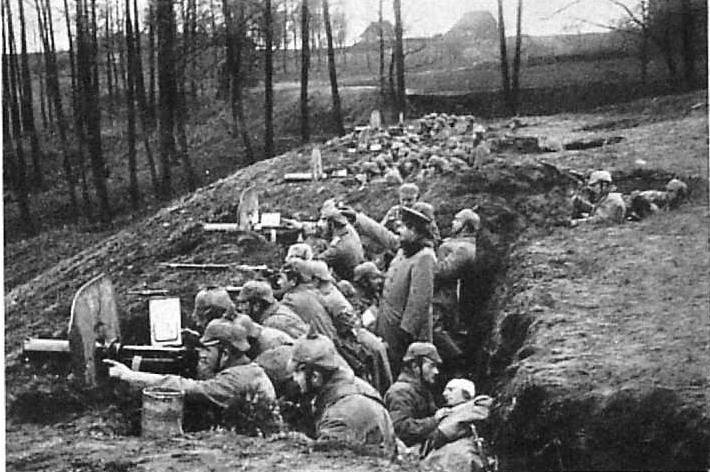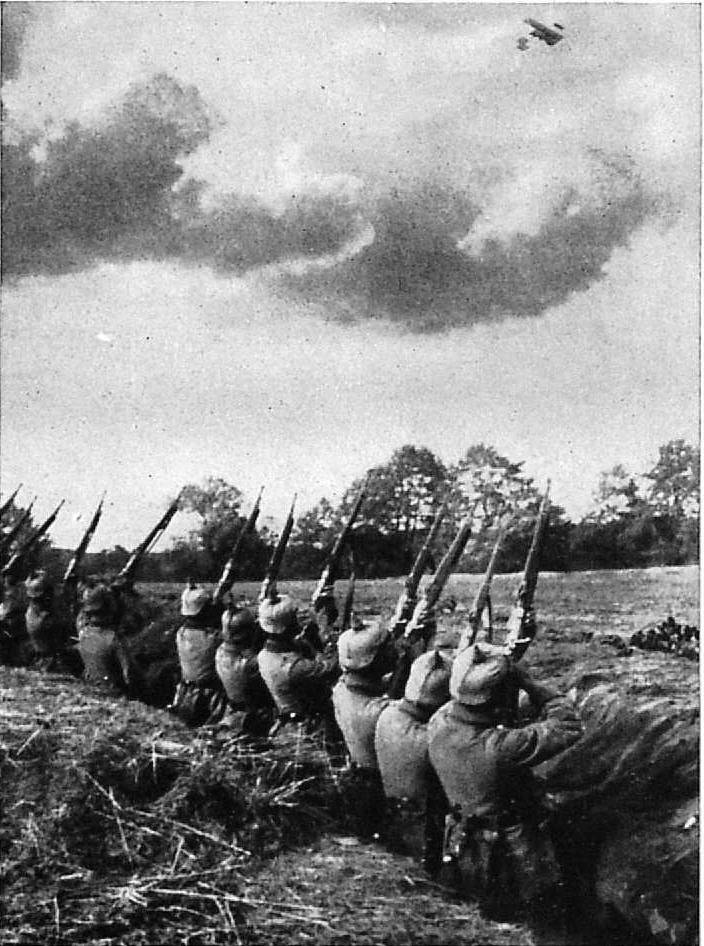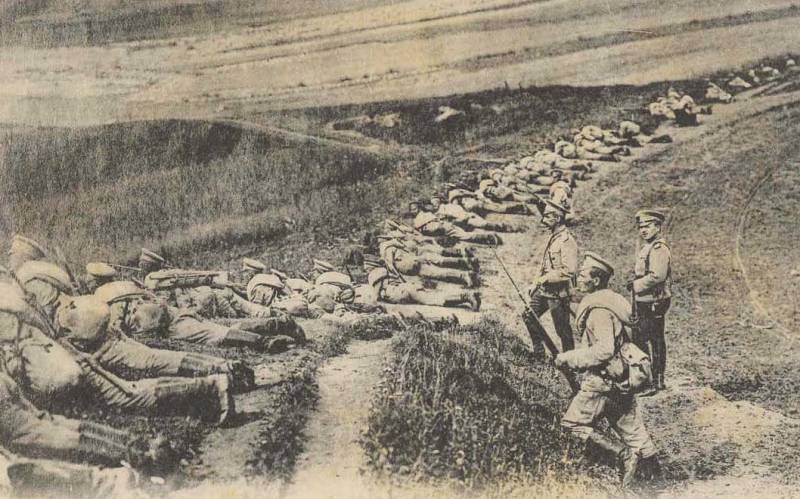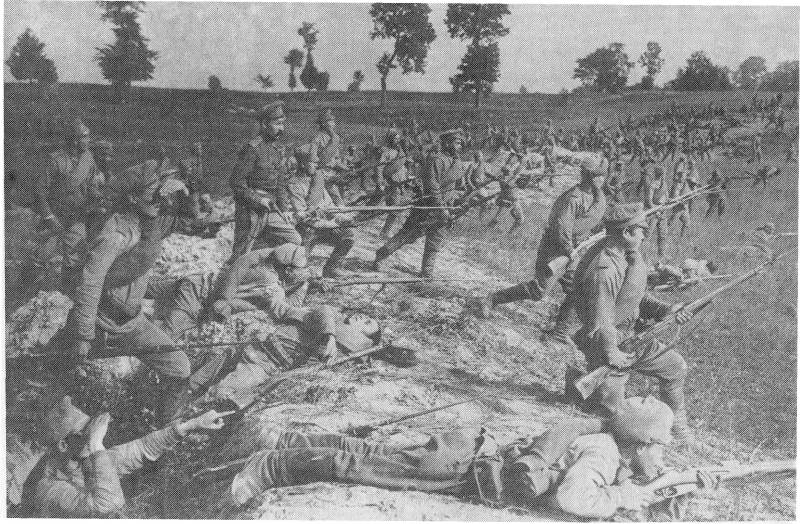The decisive battle of the First World War. East Prussian operation 1914 of the year. The main reasons for the operational defeat of Russian troops
The operational design of the East Prussian operation was an attempt by the 1 and 2 armies to secure the encirclement of the 8 army. The main forms of operational maneuver - breakthrough and flank coverage. In the First Battle of the Masurian Lakes, the 1 Army went over to the defensive.
The operational result was the opposite of what was intended - the shock group of the 2 Army was subjected to the environment. The 8 Army, effectively moving and maneuvering, was able to temporarily neutralize both armies of the North-Western Front, inflicting defeats in turn.
If we consider the main, in our opinion, causes of failure, then they boiled down to the following circumstances.
1. The lack of proper control by the front command. Ya. G. Zhilinsky did not control the situation, his activity was expressed exclusively in the issuance of directives (for the 2 Army, a pulling character). N. N. Golovin characterized him as a military bureaucratic leader who put the form above the essence and usefulness of the cause [Golovin N.N. From stories 1914 campaigns. Plan of war. C. 77]. V. Gurko also agrees with him, noting that the events of the operation confirmed the impression of the inability of Zhilinsky to lead the front. His main task was to coordinate the actions of the armies of Samsonov and Rennenkampf - and he could not perform it [Gurko V.I. Decree. cit. C. 25].
His behavior was duly evaluated by both the commission of the Supreme Commander and historians. In particular, V. A. Melikov noted that the command of the operation in East Prussia "destroyed many Russian troops, distinguished by their combat qualities, which the Germans themselves openly admit" [Melikov V. A. Decree. cit. C. 311]. F. Khramov wrote that the command of the front and the armies in this operation showed “weak operational readiness and insufficient ability to control large military masses in the theater of war. These weaknesses of the command were further aggravated by the unpreparedness of the theater of operations and the great difficulties of the material support of the troops. ” [Temples F. Decree. cit. C. 69].
It is worth noting that many of the weaknesses of the Russian command at that time were also characteristic of the command of the Allies in the Entente. So, the same V. A. Melikov, describing the situation prevailing on the French front in the Border Battle, noted that after the start of the general mobilization of the French command, the will to win was greatly weakened. And the advancing troops were not sent by the confident, firm hand of the commander, who clearly knows what he wants, and who has a strategic perspective. [Melikov V. A. Decree. cit. C. 199].
AV Samsonov actually implemented his own general plan modification, while P. KG Rennenkampf sometimes had difficulty with the initiative.
The chain of Russian infantry in East Prussia
At the same time, mitigating circumstances include the fact that the generals had to act in the conditions of the start of an unprecedented war.
2. There was no interaction between the 1 and 2 armies. This is the fault of the commanders, who did not establish "elbow cooperation" before and during the operation, and the front commander, who failed to link the separate actions of his armies into a single front-line operation.
From the moment of the transfer of the main forces of the enemy against A.V. Samsonov, assistance to the latter from P.-G.K. Rennenkampf was reduced to a minimum. E. Ludendorff wrote that the 1 Army during the implementation of the "Tannenberg" hung like a terrible cloud in the northeast. If she moved, the Germans would have been defeated.
But in order to destroy the plans of the German command, the 1 army should not just move, but go about 60 km in a straight line (and then just to get in touch with the right flank of the 2 army and that stay in place). But the main forces of the 1 Army were to cross over 100-110 km (at least 2 of the forced march day with precise target designation).
The 2-day delay in the movement of the army of P.-G.C. Rennenkampf (7 - 9 of August), which the Germans learned from the plain-text radiogram, was more important for the outcome of the operation than if the 1 army then moved to help 2
Time has been lost.
And the slowness of the 1 Army’s advance from August 10, with transitions of no more than 15 km, enabled the enemy to regroup against the 2 Army.
The command of the 2 Army proceeded from a biased assessment of the situation allegedly established after the Gumbinnen battle. It was believed that the main mass of troops of the 8-th army hastily retreats to the Vistula, and only a barrier covering the withdrawal acts against the 2-th army. And from here the conclusion was made: with a hurried offensive, it is necessary to knock down the enemy's barrier and intercept the ways of his withdrawal.
Атака
3. There is a weakness of the forces and means allocated for solving the problem. We wrote about this in the first article of the cycle. Moreover, it was thought that the front would have enough power in abundance (!) And a number of units designated as its members went to Poland. The enemy was underestimated, and his strength was overvalued.
4. It should be noted, and the unsatisfactory actions of the Russian cavalry (with the exception of the 1 Cavalry Division of V. I. Gurko) - it could not, after a series of successful fights, establish the pursuit of the enemy, proper interaction with the infantry, to conduct strategic reconnaissance.

German machine-gunners in anticipation of the attack of Russian troops. East Prussia
5. Breach of secrecy in communications [Let us dwell on this issue in the next series of articles].
But at the same time, even having at its disposal numerous advantages - above all, Russian radio telegrams - the Germans missed a whole number of the possibilities that appeared. The reason is the operational blunders (sometimes untidiness) of some German military leaders and the tactical actions of the German troops who were very unsuccessful in tactical terms, who suffered heavy defeats in a series of battles [Evseev N. Decree. cit. C. 281].
Even in the battle near the Masurian Lakes, with obvious numerical and fire superiority, the actions of the German command often left much to be desired (the Germans “ousted” the army of P.- G. K. Rennenkampf from East Prussia). Thus, during the battle, having met a serious rebuff of the Russian troops, the commander of the AK 20, F. von Scholz, obtained the permission of the army command to conduct a protracted battle, and the commander of the GRK, M. von Halwitz, when his unit suffered serious losses from the fire of the Russian artillery, ordered and stop the offensive altogether.
6. Sluggish and indecisive actions of the flank 1 and 6 corps of the 2 army (having retreated, they allowed to cover the core of the army).
Even after the failure that had befallen them, “together with the cavalry with a decisive attack on the flank groups of the Germans, they could hold them and gain time for the withdrawal of 13 and 15 of the Armenian Army. enclosures. It was necessary to categorically demand from the commanders of 6 and 1 th arm. corps of energetic and decisive action. This was not done, because the command of the 2 Army did not know the situation on the army front " [Temples F. Decree. cit. C. 48].
True, the commander of the 1 Army Corps formed a joint detachment to help the surrounded troops, who in the evening of August 16 marched out of Mlawa, reaching Neidenburg at night. The next morning, he suddenly attacked the Germans and captured the city. And in the ranks of the German units, panic reappeared - and the officers fled first. [Collection of documents. C. 401].
Rejecting the enemy on 10 km, part of the detachment, because of the weariness of the night 35-kilometer march, could not build on their success. The commander of the German 1 corps, G. von Francois, to repel this blow, was forced to significantly weaken the ring of the surrounding remnants of the Russian 13 and 15 corps, turning the front of a number of units from the north to the south-west. And if there was a unified control of the surrounded Russian troops by the commander or one of the cavalry, there was a chance to defeat the German 2 Infantry Division, which closed the encirclement on the Mushaken-Grünflis section, and break through to Mushaken-Neidenburg.
7. Inadequate leadership of the 2 Army by commander A.V. Samsonov, who removed Yuz’s army apparatus (voluntarily depriving himself of communication) in August 15 in Neidenburg, who left the army command post and left it without leadership during the crisis moment of the battle.
After releasing the controls from his hands, he ceased to lead the army, having left for the advanced units. The behavior of the commander imposed imprint objectively arising problems with communication. At the same time, having left for the troops, A.V. Samsonov violated one of the most important rules of the commander, demanding to choose for his headquarters a point to which operational information could flow without delay, and from where he could keep in contact with the troops. As noted by V.I. Gurko, communication problems can lead to the fact that the commander is trying to get closer to the battlefield, trying to compensate for the shortcomings of the communications system with the troops by his personal presence. But the tendency to generalize, inherent in almost every man, inevitably leads him to the conclusion that what is happening in front of his eyes also takes place in combat areas that he personally cannot observe - and therefore the success or failure of that part of the troops, which he observes, can to induce him to give orders to the whole army, which, responding to the situation that develops immediately before his eyes, will have a catastrophic effect on the course of the entire operation [Gurko V.I. Decree. cit. C. 85].
The course of the operation showed that not only the Russians, but also many German corps commanders, without having the necessary operational outlook, acted to the detriment of the cause. The exception in the period of 13-18 of August were the Germans - G. Francois (commander 1 AK) and O. Belov (commander 1 RK), and the Russians - N. Martos (commander 15 AK). The climate of maneuvering warfare demanded tight control of the formations and formations. In this regard, the German command authorities proved to be somewhat more solid. [Evseev N. Decree. cit. C. 285].
But the quality of the German command also caused serious criticism of specialists. In particular, the 1-th plan of the environment of the core of the 2-th army (at Hohenstein) was thwarted. First, the Russian troops defeated both divisions of the 20 Army Corps (at Orlau and Vaplitsa). The 13 Army Corps 15 of August, with a flank blow north of Hohenstein, inflicted a heavy defeat on the Goltz division. Thus, the 15 division defeated at Waplitz by parts of the 41 corps went into a panic and began to indiscriminately retreat — namely, it had to close the Russians from the Hohenstein to the south. Secondly, the 1 th reserve and 17 th army corps did not perform their tasks on August 15. Between the comors O. Belov and A. Mackensen on the subject of who would attack Allenstein, even a conflict broke out that required the intervention of the commander-in-chief — and these compounds were trampling at Wartenburg without closing the passages southeast of Hohenstein [Temples F. Decree. cit. C. 59].
The environment happened in a different way and by chance. For example, the 17 Corps, having not received a new combat mission for technical reasons on 16 August (to turn against the 1 Army), continued to carry out the old one - if, having received a new order, it was located east of Allenstein, then the 13 and 15 surroundings th corps, most likely, was not. On the night of August 16, E. Ludendorff reported to the High Command that the pursuit of the Russian corps of 2 would continue, but the entourage most likely would not succeed. That is, the lack of communication with the 17 Corps corrected the error of the command of the 8 Army and helped the Germans surround the center of the 2 Army.
Thus, at this stage of the operation, the encirclement of the Russian troops was a "pleasant surprise" for the German command, who in retrospect believed in its genius and infallibility.

Shooting a Russian airplane
8. The exhaustion of Russian troops on the marches (especially the 2 Army) even before the start of serious battles, poor infrastructure and material support, isolation from supply bases (which was largely due to haste). N. Evseev reflected with reference to the “Samson catastrophe” that “Cannes” became the last, accidental and not the main stage of the operation of the 8 army. Surrounded corps were exsanguinated earlier. The 13 corps lost a significant part of its forces in the operational-tactical barriers (Dareten, Allenshteyn, Hohenstein, Grislininen). The 15 corps, even before the encirclement, lost more than half of the troops in the 10-13 battles of August - its regiments and attached parts of the 23 corps were only battalions. Accordingly, by the time the “ninth wave” of combat tests approached, the units had already been exhausted. Kombrig summarizes: if the Russian regiments surrounded in the Komuzinsky forests were at least full-blooded battalions fed and having the necessary amount of ammunition - they could go in any direction [Evseev N. Decree. cit. C. 284].
The commander of the 13 AK AK N. Klyuev described the 15 day of August as follows: “It was already the 6-th day of a hard march without days; impassable sands exhausted people and horses. Sukharey were somewhere for one day, but in many parts they were not at all, as well as oats and salt. During the night in Allenstein they managed to collect a certain amount of bread and distribute them to the most needy [Temples F. Decree. cit. C. 56].
With such material support, it was difficult to count on the success of the operation. It is worth noting here that some researchers [K. Perepelovsky. The Role and Importance of the Russian Front in the 1914 — 1917 War. according to foreign military sources // Military Profit. 1971. No. 111. C. 8-9] believe that only swiftness (albeit the underdeveloped Russian troops) could give victory and effectively help France. Considering the specifics of the theater of operations, the Germans were working out the specifics of this type of battle even before the war, there is a grain of truth in this — the chance for success in carrying out swift actions increased compared with the situation when a planned offensive of trained troops would face a strong German grouping arrived from France. A supporter of this point of view was V.I. Gurko. The general noted that the Germans preferred to deliver the main blow to France - as an enemy who would be mobilized earlier than Russia. Germany was counting on the slowness of the Russian mobilization, especially since Austria had to launch an attack on Volyn, in Podolia and on the right bank of the Vistula. But the Russian offensive began earlier than the Germans had expected - in East Prussia it was secured by a breakthrough that Rennenkampf carried out, despite the instructions of Zhilinsky that bound him [Gurko V.I. Decree. cit. C. 31].
Perhaps only such a "sweeping" and swift attack in East Prussia could destroy German strategic calculations and force the enemy to unplanned troop movements to the East.


Information